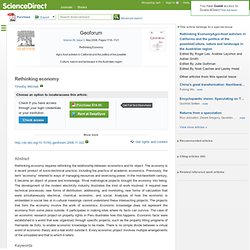

Mitchell - The Politics of Knowledge: Area Studies and the Disciplines. Questions of Modernity. Modernity has always laid claim to universal certainty—which meant assigning a different and lesser significance to anything deemed purely local, non-Western, or lacking a universal expression.
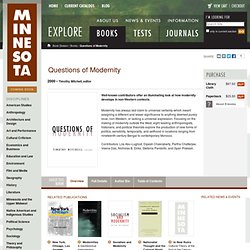
This book makes those very non-Western, non-universal elements the tools for fashioning a more complex, rigorous, and multifaceted understanding of how the modern comes about. Focusing on the making of modernity outside the West, eight leading anthropologists, historians, and political theorists explore the production of new forms of politics, sensibility, temporality, and selfhood in locations ranging from nineteenth-century Bengal to contemporary Morocco. Topics include the therapeutics of colonial medical practice, the multiple registers of popular film, television serials and their audiences, psychiatrists and their patients, the iconic figure of the young widow, and the emergence of new political forms beyond the grasp of civil society.
Carbon Democracy: Political Power in the Age of Oil. As tumultuous events in Egypt unfold at speed, with former President Morsi currently in custody, we present Verso's updated reading list of key titles and articles addressing the challenges facing Egypt and the Middle East.
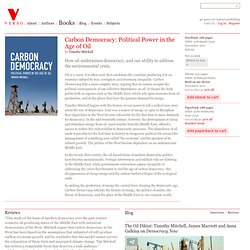
Seamus Milne considers the current situation in Egypt in the context of the Arab Spring and its historical precedents in the "Spring of Nations" of 1848 in his latest article for the Guardian. His latest book, The Revenge of History, follows the events of the Arab Spring as they unfold, as well as providing a rich geopolitical context for the uprisings.
The Journey to Tahrir: Revolution, Protest, and Social Change in EgyptEdited by Jeannie Sowers and Chris Toensing The account of how it all began, this collection of reports from the region details the causes that underpinned the revolution before it amassed in scale. Soldiers, Spies and Statesmen: Egypt's Road to Revoltby Hazem Kandil Continue Reading. Colonising Egypt : Timothy Mitchell. Rule of Experts : Timothy Mitchell. Can one explain the power of global capitalism without attributing to capital a logic and coherence it does not have?
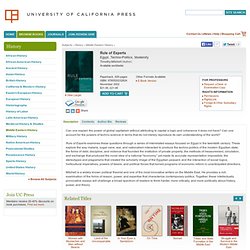
Can one account for the powers of techno-science in terms that do not merely reproduce its own understanding of the world? Rule of Experts examines these questions through a series of interrelated essays focused on Egypt in the twentieth century. Mitchell is a widely known political theorist and one of the most innovative writers on the Middle East. He provides a rich examination of the forms of reason, power, and expertise that characterize contemporary politics. Together, these intellectually provocative essays will challenge a broad spectrum of readers to think harder, more critically, and more politically about history, power, and theory. List of Illustrations Acknowledgments Note on Transliteration Introduction I.
NotesSelect BibliographyIndex “Timothy Mitchell’s new book is brilliant. “Exciting and intellectually stimulating.” Columbia University. Timothy Mitchell is a political theorist who studies the political economy of the Middle East, the political role of economics and other forms of expert knowledge, the politics of large-scale technical systems, and the place of colonialism in the making of modernity.
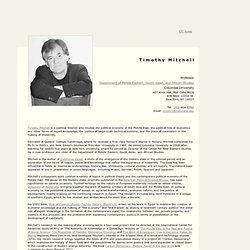
Educated at Queens' College, Cambridge, where he received a first-class honours degree in History, Mitchell completed his Ph.D. in Politics and Near Eastern Studies at Princeton University in 1984. He joined Columbia University in 2008 after teaching for twenty-five years at New York University, where he served as Director of the Center for Near Eastern Studies. He is now professor and chair of the Department of Middle Eastern, South Asian, and African Studies.
Abstract. The work of economics: how a discipline makes its world Abstract What is the work of economics?
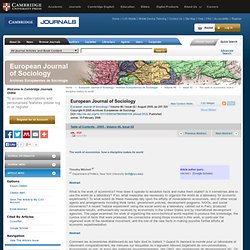
How does it operate to establish facts and make them stable? Is it sometimes able to use the world as a laboratory? If so, what measures are necessary to organize the world as a laboratory for economic experiments? Comment les économistes établissent-ils les faits dont ils traitent ? Wie arbeiten Wirtschaftswissenschaftler? Rethinking economy 10.1016/j.geoforum.2006.11.022 : Geoforum.
Volume 39, Issue 3, May 2008, Pages 1116–1121 Rethinking Economy Edited By Roger Lee, Andrew Leyshon and Adrian Smith Agro-food activism in California and the politics of the possible Edited By Julie Guthman Culture, nature and landscape in the Australian region Edited By Noel Castree and Lesley Head Abstract Rethinking economy requires rethinking the relationship between economics and its object.
